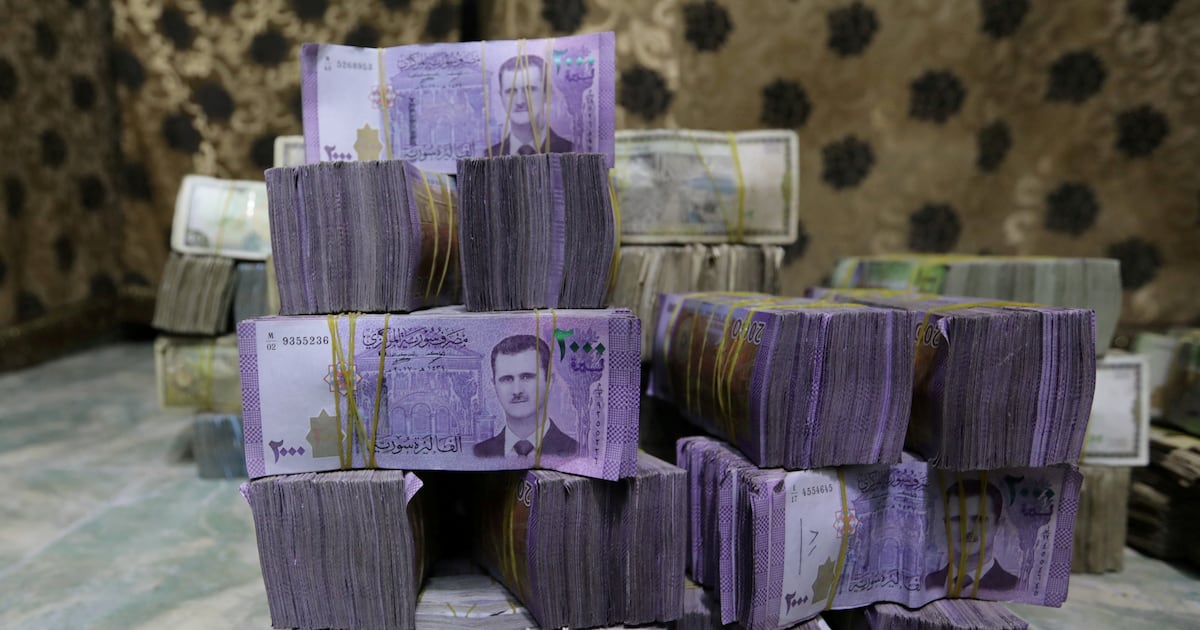Syria will issue new banknotes, removing two zeroes from its currency in an attempt to restore public confidence in the severely devalued pound, according to sources and documents seen by Reuters.
The step is intended to strengthen the Syrian pound after its purchasing power collapsed to record lows after a 14-year civil war that ended with former president Bashar Al Assad’s downfall in December.
The pound has lost more than 99 per cent of its value since the war erupted in 2011, with the exchange rate now at around 10,000 pounds to the US dollar, compared to 50 before the conflict.
The sharp depreciation has made daily transactions and money transfers increasingly difficult for many.
Families usually pay for weekly grocery runs from black plastic bags holding at least half a kilogram of 5,000-pound notes, currently the highest denomination.
In an attempt to ease transactions and improve monetary stability, Syria’s Central Bank informed private banks in mid-August that it intended to issue new currency by “removing zeroes”, according to a document seen by Reuters.
Reuters spoke to five commercial bankers, one Central Bank source and one Syrian economic official who said the Central Bank later informed them that two zeroes would be removed. The decision has yet to be made public.
Legislative approval
Meetings on the currency overhaul have been chaired by Central Bank deputy governor Mukhlis Al Nazer, said the commercial bankers who attended the talks.
Mr Al Nazer did not reply to a request for comment. Amal Al Masri, the head of the Central Bank’s Banking Supervision Department, declined to comment, saying the matter was strictly confidential. The Syrian Finance Ministry also did not respond to a request for comment.
It was not immediately clear whether the revaluation of the pound would need legislative approval. Post-Assad Syria is set to hold its first elections to set up a new legislative assembly in September.
Two of the bankers and another Syrian source told Reuters that Syria had agreed with Russian state-owned money printing firm Goznak to produce the new notes.
They said the deal was finalised when a senior Syrian delegation visited Moscow in late July. Goznak, which also printed Syria’s currency during the Al Assad era, did not respond to requests for comment.
Under Mr Al Assad, the use of foreign currency was outlawed but Syria’s new leaders have pledged to create a free-market economy and lifted restrictions to ease cash flow.
While the economy has swiftly dollarised, with US dollar prices everywhere from shopfronts to fuel pumps, there are concerns about a Syrian pound liquidity crunch in a country with limited infrastructure for digital payments.
Drivers of change
Three of the Syrian bankers said one driving force behind the planned currency overhaul was concern over an estimated 40 trillion pounds circulating outside Syria’s formal financial system. Issuing new notes would grant the government better oversight of the cash in circulation.
It also carries symbolic weight, signalling a clear break from more than five decades of Al Assad rule: Bashar’s face appears on the 2,000-pound purple note, while his father, Hafez, features on the green 1,000 pound.
Officials plan an information campaign in the coming weeks before the launch of the new notes on December 8, the first anniversary of Mr Al Assad’s downfall.
Two commercial bank directors told Reuters that Syria’s Central Bank has instructed lenders to be ready by mid-October.
Central Bank circulars seen by Reuters asked banks to produce detailed reports on their infrastructure, including the number of cameras, cash counters and storage capacity, and run tests to ensure automated systems could handle the new currency.
All five commercial bankers said they were told a 12-month “coexistence period” would allow both old and new notes to circulate until December 8, 2026.
Karam Shaar, a leading Syrian economist and consultant to the UN, said replacing banknotes featuring Mr Al Assad’s image was a necessary political shift.
But he warned the revaluation could confuse consumers, especially the elderly, and there was a lack of a clear regulatory framework or plan for full national implementation, given the gaps in the state’s territorial control.
“Alternatively, Syria could issue higher denominations of the same currency, say 20,000 or 50,000-pound notes, which would achieve similar goals in terms of easing cash handling and storage, while avoiding the substantial cost of a full currency overhaul, which could run into hundreds of millions of dollars,” Mr Shaar told Reuters.
The specs
- Engine: 3.9-litre twin-turbo V8
- Power: 640hp
- Torque: 760nm
- On sale: 2026
- Price: Not announced yet
ABU%20DHABI’S%20KEY%20TOURISM%20GOALS%3A%20BY%20THE%20NUMBERS
%3Cp%3EBy%202030%2C%20Abu%20Dhabi%20aims%20to%20achieve%3A%3C%2Fp%3E%0A%3Cp%3E%3Cstrong%3E%E2%80%A2%2039.3%20million%20visitors%2C%3C%2Fstrong%3E%20nearly%2064%25%20up%20from%202023%3C%2Fp%3E%0A%3Cp%3E%3Cstrong%3E%E2%80%A2%20Dh90%20billion%20contribution%20to%20GDP%2C%3C%2Fstrong%3E%20about%2084%25%20more%20than%20Dh49%20billion%20in%202023%3C%2Fp%3E%0A%3Cp%3E%3Cstrong%3E%E2%80%A2%20178%2C000%20new%20jobs%2C%3C%2Fstrong%3E%20bringing%20the%20total%20to%20about%20366%2C000%3C%2Fp%3E%0A%3Cp%3E%3Cstrong%3E%E2%80%A2%2052%2C000%20hotel%20rooms%2C%3C%2Fstrong%3E%20up%2053%25%20from%2034%2C000%20in%202023%3C%2Fp%3E%0A%3Cp%3E%3Cstrong%3E%E2%80%A2%207.2%20million%20international%20visitors%2C%3C%2Fstrong%3E%20almost%2090%25%20higher%20compared%20to%202023’s%203.8%20million%3C%2Fp%3E%0A%3Cp%3E%3Cstrong%3E%E2%80%A2%203.9%20international%20overnight%20hotel%20stays%2C%3C%2Fstrong%3E%2022%25%20more%20from%203.2%20nights%20in%202023%3C%2Fp%3E%0A
HAEMOGLOBIN DISORDERS EXPLAINED
Thalassaemia is part of a family of genetic conditions affecting the blood known as haemoglobin disorders.
Haemoglobin is a substance in the red blood cells that carries oxygen and a lack of it triggers anemia, leaving patients very weak, short of breath and pale.
The most severe type of the condition is typically inherited when both parents are carriers. Those patients often require regular blood transfusions – about 450 of the UAE’s 2,000 thalassaemia patients – though frequent transfusions can lead to too much iron in the body and heart and liver problems.
The condition mainly affects people of Mediterranean, South Asian, South-East Asian and Middle Eastern origin. Saudi Arabia recorded 45,892 cases of carriers between 2004 and 2014.
A World Health Organisation study estimated that globally there are at least 950,000 ‘new carrier couples’ every year and annually there are 1.33 million at-risk pregnancies.
